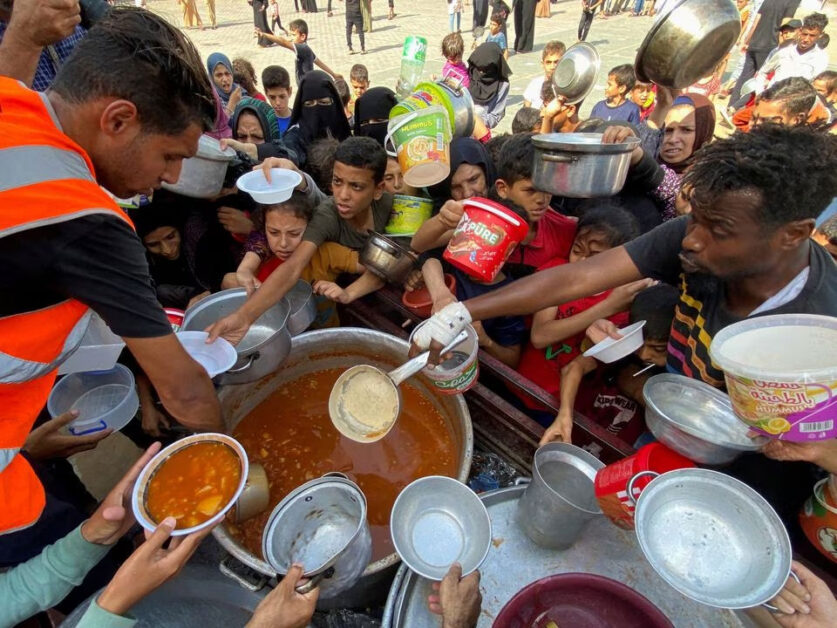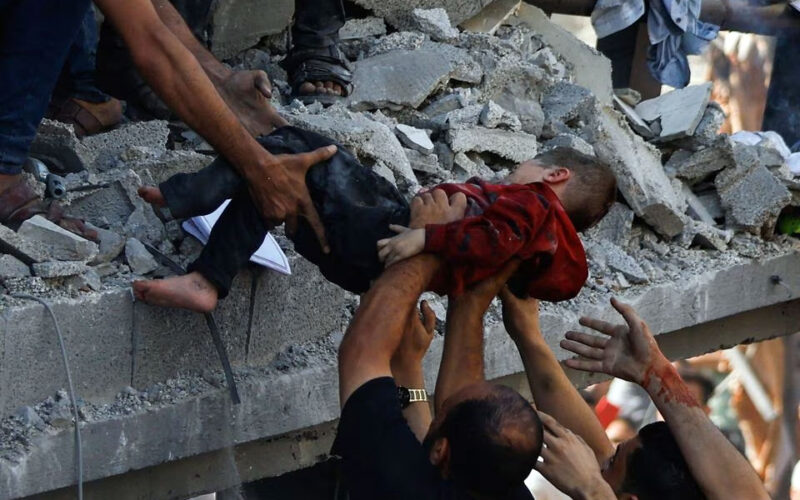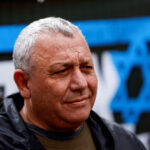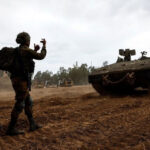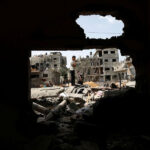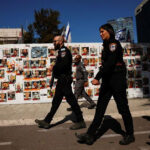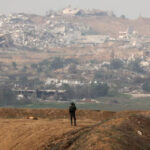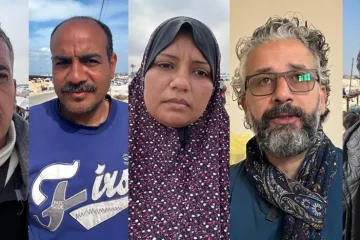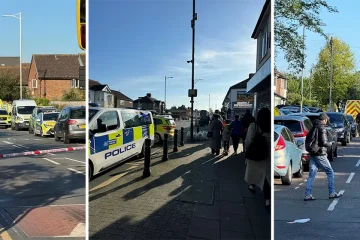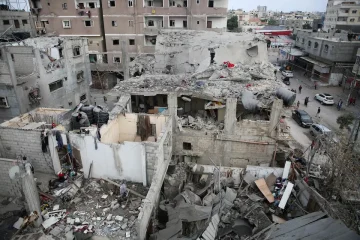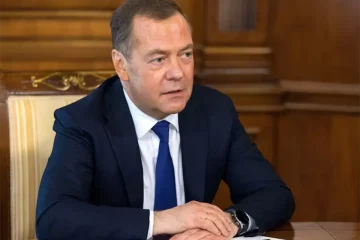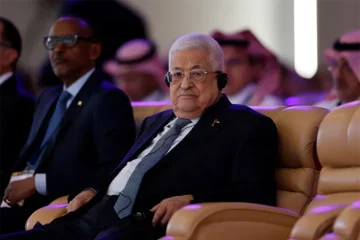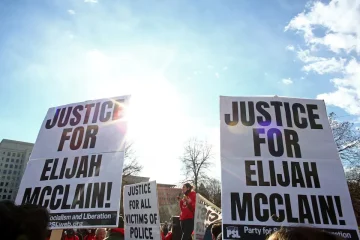THE Palestinian health ministry said that Israeli air strikes had killed more than 700 Palestinians in Hamas-run Gaza overnight, the highest 24-hour death toll in Israel’s declared two-week-old total siege of the narrow strip.
United Nations agencies pleaded “on our knees” on Tuesday for emergency aid to be allowed unrestricted into Gaza, saying more than 20 times current deliveries were needed to support the Palestinian population after two weeks of Israeli bombardment.
The Israeli military said it had hit over 400 Hamas militant targets and killed dozens of its fighters overnight, but that it would take time to destroy Gaza’s ruling Islamist group, whose deadly cross-border attack on October 7 shocked Israel.
With international aid agencies warning of a humanitarian catastrophe unfolding in the tiny, impoverished strip, one of the world’s most densely populated places, French President Emmanuel Macron flew to Israel to offer it support.
Macron told Prime Minister Benjamin Netanyahu that France stood “shoulder to shoulder” with Israel in its war with Hamas but that it must not fight “without rules”. Netanyahu said Israel would try to protect civilians as it worked to ensure they “will no longer live under Hamas tyranny”.
U.N. Secretary-General Antonio Guterres pleaded on Tuesday for civilians to be protected in the war, voicing concern about “clear violations of international humanitarian law” in Gaza.
The World Health Organization, in the latest of increasingly desperate U.N. appeals, called for “an immediate humanitarian ceasefire” to allow safe deliveries of aid.
Doctors in Gaza say patients arriving at hospitals are showing signs of disease caused by overcrowding and poor sanitation after more than 1.4 million people fled their homes for temporary shelters under Israel’s heaviest-ever bombardment.
All hospitals say they are running out of fuel to power their electricity generators, leaving them increasingly unable to treat the injured and ill.
There appeared to be little prospect of a ceasefire any time soon in the bloodiest chapter of the Israeli-Palestinian conflict for decades.
Gaza’s health ministry said at least 5,791 Palestinians had been killed by Israeli bombardments since Oct. 7, including 2,360 children. A total of 704 were killed in the previous 24 hours alone, it said.
Ministry spokesman Ashraf Al-Qidra said it was the highest 24-hour number of deaths in the two weeks of Israeli bombing.
After an air strike in Khan Younis in south Gaza, Abdallah Tabash held his dead daughter Sidra, refusing to let go as he held her bloodstained face and hair. “I want to look at her as much as I can,” he said.
Israeli tanks and troops are massed on the border between Israel and Gaza awaiting orders for an expected ground invasion. It is an operation that may be complicated by fears for the hostages’ welfare and by militants heavily armed by Iran dug into a crowded urban setting using a vast network of tunnels.
The bombardments were unleashed in response to a shock cross-border Hamas assault into southern Israel in which gunmen killed over 1,400 people – mostly civilians – in a single day.
‘I’VE BEEN THROUGH HELL’
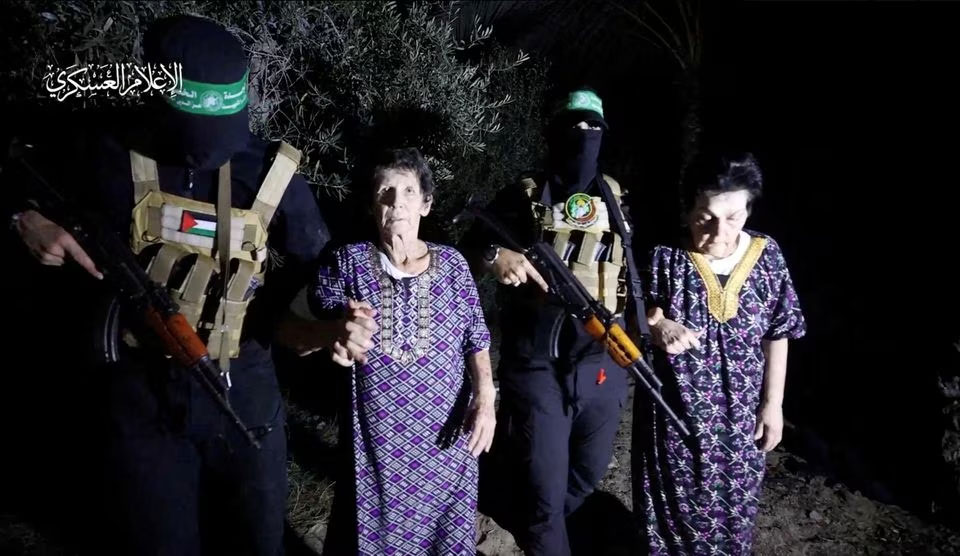
Hamas on Monday freed two Israeli women who were among the more than 200 hostages taken during the rampage – the third and fourth to be released.
One of those freed, Yocheved Lifshitz, 85, said she was beaten by militants as she was abducted and had difficulty breathing. “They stormed into our homes. They beat people. They kidnapped others, the old and the young without distinction,” she said, seated in a wheelchair and speaking in barely a whisper to reporters.
“I’ve been through hell,” Lifshitz said.
Inside Gaza, a group of hostages were led into what Lifshitz called a “spider’s web” of damp tunnels and eventually reached a large hall where, under 24-hour guard, a doctor visited every other day and brought them medicines they needed.
“They treated us gently and met all our needs,” she said.
Qatari mediators are urging Hamas to quicken the pace of hostage releases to include more women and children and to do so without expecting Israeli concessions, according to three diplomats and a source in the region.
‘READY AND DETERMINED’
Among the targets Israel said it hit overnight was a tunnel that allowed Hamas to infiltrate Israel from the sea, as well as Hamas command centres in mosques, it said. Reuters could not verify the report.
Wide swathes of highly urbanised Gaza have been demolished by Israeli bombs, forcing more than half of its 2.3 million people to seek shelter elsewhere in the territory. Food, clean water, medicine and fuel are fast running out.
Residents said several people were killed or wounded when an Israeli missile hit a petrol station in Khan Younis, where people who fled the eastern side of the city were gathered to charge their devices and fill water canisters.
“They bombed them in their sleep,” said Abdallah Abu Al-Atta, who lives by the petrol station.
More than 40 medical centres halted operations after they ran out of fuel or were damaged by Israeli bombing, the health ministry spokesman said.
‘NO GREEN LIGHT’
How soon Israel might launch a full-scale invasion of Gaza remains unclear. The Middle East’s most powerful military faces a group that has developed a powerful arsenal with Iran’s help.
World powers are concerned the conflict could ignite the entire Middle East and some have urged Israel to exercise restraint while affirming its right to self-defence.
Deadly clashes have escalated between the Israeli military and Palestinians in the occupied West Bank and resurged between Israel and Lebanon’s Iran-backed, heavily armed Hezbollah group along the two countries’ tinderbox border.
Fears of regional escalation focus on Iran’s network of proxies in Syria, Iraq and Yemen. Any wider conflagration would jeopardise security in a region key to global energy supplies.
U.S. Secretary of State Antony Blinken told the U.N. Security Council on Tuesday Washington does not seek conflict with Iran, but warned it would act swiftly and decisively if Tehran or its proxies attacked U.S. personnel anywhere.
U.S. officials told Reuters the U.S. military is taking new steps to protect its troops in the Middle East as concerns mount about attacks by Iran-backed groups, and it is leaving open the possibility of evacuations of military families if needed.
